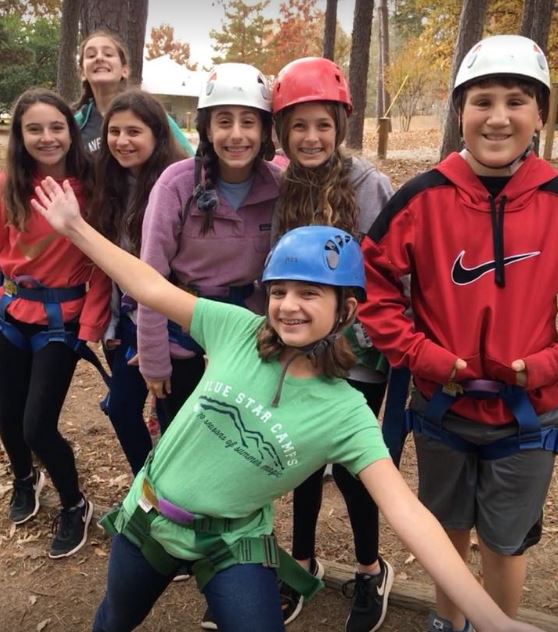Chanukah celebrates the proverbial light in the darkness, the hope that comes from flickering flames in the midst of a cold winter night, the story of the nascent Jewish people’s triumph over seemingly overwhelming forces. On Chanukah, miracles happen; the impossible is made possible.
Chanukah bolsters our ability to hope.
The power of hope is that it enables us to dream of something more, something bigger and better, something greater. And while our sages teach us that the rich of the world are those who are “sameyach b’chelko,”[1] content with what they have, they also teach us to reach further, to strive. Commentary on the book of Genesis[2] teaches us that we each have two forces inside of us – the yetzer hatov, an inclination toward good, and the yetzer hara, an inclination toward evil. And while our yetzer hatov guides us to “do the right thing,” (a slippery phrase that often doesn’t look or feel as right as it very well might be), our yetzer hara, our inclination toward pleasure and material wealth, that which the rabbis saw as “evil-leaning,” is also the inclination that drives us to improve our circumstances, to do more, to strive for bigger and better things.
3rd century commentator Rabbi Natan, in teaching on the yetzers, suggests that we are each born with a yetzer hara, an inclination toward evil, but not until we reach age 13, the Jewish age of maturity, do we develop our yetzer hatov.
Rabbi Natan clearly didn’t know the kids I spend time with here at Temple Beth El. Our kids speak eloquently about the mitzvot of welcoming guests into their spaces, teaching me all of the ways in which they would help people feel at home in their homes. Our kids travel to Sunrise, walk up to strangers, men and women some of whom have had no visitors in weeks, and ask if they would like a hug. Our kids pray with their whole bodies, singing and dancing during Mi Chamocha with a freedom we lose once we begin wondering who might be judging our movements.
Or perhaps Rabbi Natan wasn’t all wrong. Perhaps that yetzer hara, unchecked though it may be, is what allows kids to see the world without so many boundaries, so many restrictions. Perhaps that inclination toward pleasure gives them the freedom to hug strangers and dance with abandon.
I often hear people suggest that the younger generation are our future. Congregants speak frequently about the need to bring the next generation more fully into the community, about our youth as the hope for our future as a Jewish people.
And while I am deeply interested in welcoming people of all generations into this community, I struggle with the idea that the youth are our future. Because they’re actually here, right now, in the present.
Hopefully “the next generation” (and what that means differs widely depending on which generation you consider yourself to be part of) will be engaged and involved far into the future, but that generation is also literally here now.
Only when we engage them in the present, celebrate them in the present, and build relationships with them in the present do we give them the chance to see in themselves the future we see in them.
“The younger generation” is exhausting, believe me, I know. I just spent a full weekend running around Charleston with our confirmation class, followed the next weekend by 24 hours up at Camp Thunderbird with our seventh graders, our Sheva class.
And, “the younger generation” is energizing – watching teens break down barriers, step outside of their comfort zones, and navigate new places together reminded me that all of those uncomfortable but important tasks are possible. Watching our Sheva students work together to build beautiful and hilarious outfits out of discarded newspaper reminded me that with a little imagination, the top news stories of November 5, 2005 can be transformed into opportunities for community-building.
Friday January 12th through Monday January 15th, 250+ Jewish teens from all over Georgia, South Carolina, parts of Florida, Tennessee, and North Carolina, will descend on Temple Beth El and Shalom Park for NFTY-SAR (North American Federation of Temple Youth – Southern Area Region)’s Winter Kallah. It will be exhausting. It will be energizing. It will be inspiring.
Youth group gave me my first taste of what building my own Jewish identity might look like. Learning, praying and playing with my peers allowed me to explore Judaism in a whole new way and see this ancient religion in a whole new light. It is clear to me now that NFTY helped me develop my future – I became a rabbi in large part because of the experiences I had during my teen years. But at the time, I wasn’t thinking about what my Jewish future looked like – I was simply living it, in the present.
I invite you to help me help these teens live their Judaism in the present. Join me in welcoming them to Charlotte, to Temple Beth El, and into our homes. Please consider hosting a few teens for the weekend. They don’t need beds, just a place to roll out a sleeping bag. They don’t need your whole weekend, just enough time to live in the present with them, to show them the ways in which you engage in your Judaism too. Sign up here to host.
And if you cannot host, perhaps you might be willing to drive them to and fro at some point over the weekend.
And if you cannot host or drive, perhaps you might volunteer as a welcomer, or a meal time server, or a building navigator.
This December, may we tap into both of our inclinations, that which invites us to be content with what we have and that which drives us to improve our circumstances. This December, may we live in the present even as we look toward the future. This December, may our celebration of Chanukah increase the light and hope in our world.
Chanukah Sameach – Happy Chanukah.
[1] Pirkei Avot 4:1[2] Genesis Rabbah 9:7



